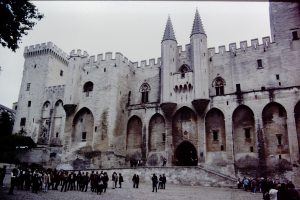 Although the Christian church was central to many aspects of medieval religious life, it was not without serious problems calling for reform. Some of these problems were religious issues and others were temporal. John Wycliffe, a 14th century scholar in England, sought to reform both. Wycliffe had a personal connection to the village of Aust as Prebend of the parish church during those years when my fictitious heroine, the Lady Apollonia, would have been raising her five sons in Aust. John Wycliffe is well known for his translation of the Bible from Latin into English so that Holy Scripture would be accessible to any in the country who were literate. He was convinced that the Bible was central to the faith of every Christian. At the same time, he was convinced that the great wealth of the church was evil. He believed that the church should be poor, as it had been in the days of Christ’s ministry on earth. John Wycliffe was eventually declared a heretic by the church and posthumously dug from his grave and burned in the 15th century, well after my novels are set.
Although the Christian church was central to many aspects of medieval religious life, it was not without serious problems calling for reform. Some of these problems were religious issues and others were temporal. John Wycliffe, a 14th century scholar in England, sought to reform both. Wycliffe had a personal connection to the village of Aust as Prebend of the parish church during those years when my fictitious heroine, the Lady Apollonia, would have been raising her five sons in Aust. John Wycliffe is well known for his translation of the Bible from Latin into English so that Holy Scripture would be accessible to any in the country who were literate. He was convinced that the Bible was central to the faith of every Christian. At the same time, he was convinced that the great wealth of the church was evil. He believed that the church should be poor, as it had been in the days of Christ’s ministry on earth. John Wycliffe was eventually declared a heretic by the church and posthumously dug from his grave and burned in the 15th century, well after my novels are set.
Another example of a doctrinal problem within the ministry of the church was the selling of indulgences which forgave the buyer from some specified time in Purgatory. There was much abuse of this practice and it later became an issue in Luther’s Reformation. In my stories, I have introduced a character, Brandon Landow, who is inspired by Geoffrey Chaucer’s pardoner in the Canterbury Tales. Landow misuses his clerical status to grow rich by selling indulgences and fraudulent relics with forged authentications by the pope.
The papacy, too, created a major quandary in the 14th century church because there was not one but two bishops who claimed to be pope, each supported by a different nation, enemies during the Hundred Years War. The pope in Avignon and was supported by the French king. The other pope was in Rome and enjoyed the support of the king of England. This temporal dispute was a problem for all faithful Christians. At one point there was even a third claimant before the matter was resolved in the 15th century.
The Papal Palace in Avignon is shown at the top.
Tags: Chaucer's England, historical fiction, medieval mysteries